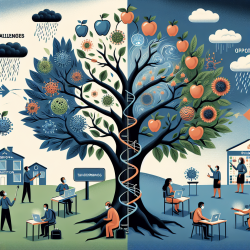Introduction
In the ever-evolving field of neuropsychology, ensuring that assessments are generalizable across diverse populations is crucial for accurate diagnosis and effective treatment. The recent research article, Best Practices and Methodological Strategies for Addressing Generalizability in Neuropsychological Assessment, provides valuable insights into how practitioners can enhance their skills by considering generalizability in their assessments. This blog will delve into the key findings of the research and offer practical recommendations for clinicians and researchers in pediatric neuropsychology.
The Importance of Generalizability
Generalizability refers to the extent to which research findings can be applied to broader populations beyond the initial study sample. In neuropsychological assessments, a lack of generalizability can lead to diagnostic errors and treatment disparities, particularly for underrepresented groups. The research highlights that many foundational studies in psychology are based on Western, educated, industrialized, rich, and democratic (WEIRD) samples, which may not accurately reflect the diverse populations clinicians encounter in practice.
Best Practices for Enhancing Generalizability
To improve the generalizability of neuropsychological assessments, the research article outlines several best practices:
- Increase Sample Diversity: Expanding recruitment strategies to include diverse populations is essential. This can be achieved through community-based participatory research and leveraging remote platforms for data collection.
- Report and Measure Sample Demographics: Accurately reporting demographic characteristics in research publications helps clinicians evaluate the applicability of assessments to their clients.
- Test for Measurement Invariance: Ensuring that assessment tools measure constructs equivalently across different groups is crucial for valid comparisons.
- Consider Cultural Competency: Clinicians should integrate cultural and linguistic factors into their assessments to ensure they are appropriate for diverse clients.
Overcoming Barriers to Generalizability
Despite the importance of generalizability, several barriers exist in implementing these best practices. These include limited resources for recruiting diverse samples and a lack of incentives for publishing replication studies. The research suggests that interdisciplinary collaborations and team science can help overcome these challenges by pooling resources and expertise.
Conclusion
Enhancing the generalizability of neuropsychological assessments is a critical step toward improving diagnostic accuracy and treatment efficacy for all clients. By implementing the best practices outlined in the research, clinicians and researchers can contribute to a more inclusive and effective field of pediatric neuropsychology. To read the original research paper, please follow this link: Best Practices and Methodological Strategies for Addressing Generalizability in Neuropsychological Assessment.










